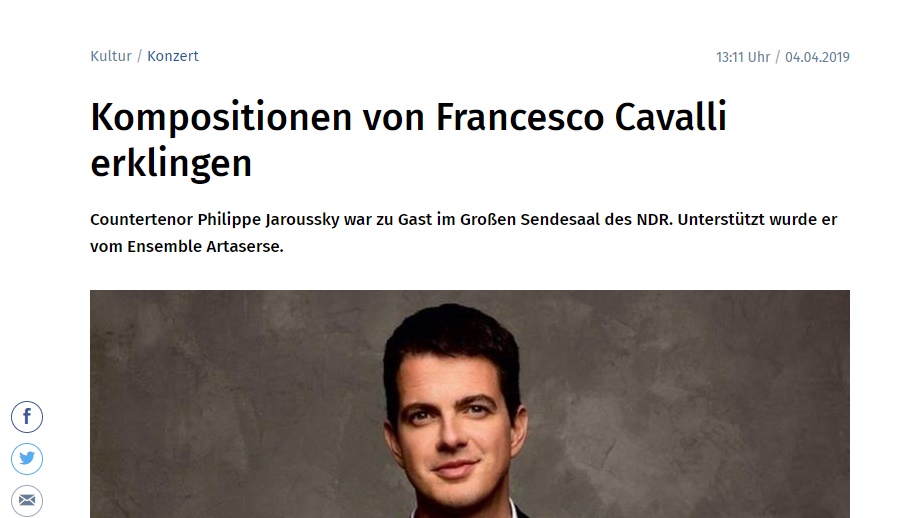2019-04-06, France Inter, by Anna Sigalevitch
Le contre ténor consacre son nouvel album au compositeur vénitien Francesco Cavalli, un des grands maîtres du seicento. Un disque paru sur le label Erato
Source/Read more/Listen to Podcast: [x]

Press Archive
2019-04-06, France Inter, by Anna Sigalevitch
Le contre ténor consacre son nouvel album au compositeur vénitien Francesco Cavalli, un des grands maîtres du seicento. Un disque paru sur le label Erato
Source/Read more/Listen to Podcast: [x]
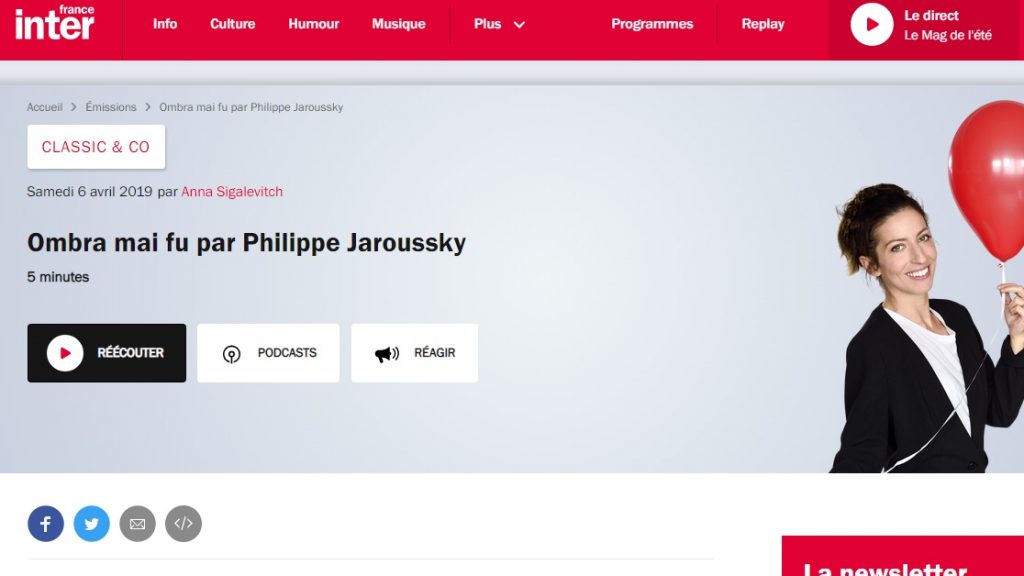
2019-04-06, Europa Press, by N. N.
“El contratenor Philippe Jaroussky junto al Ensemble Artaserse llega al Palacio de Festivales el próximo jueves, 11 de abril, dentro de su gira europea, y protagonizará un concierto con una selección de obras de Francesco Cavalli (1602-1676) y Claudio Monteverdi (1567-1613).” […]
Source/Read more: [x]
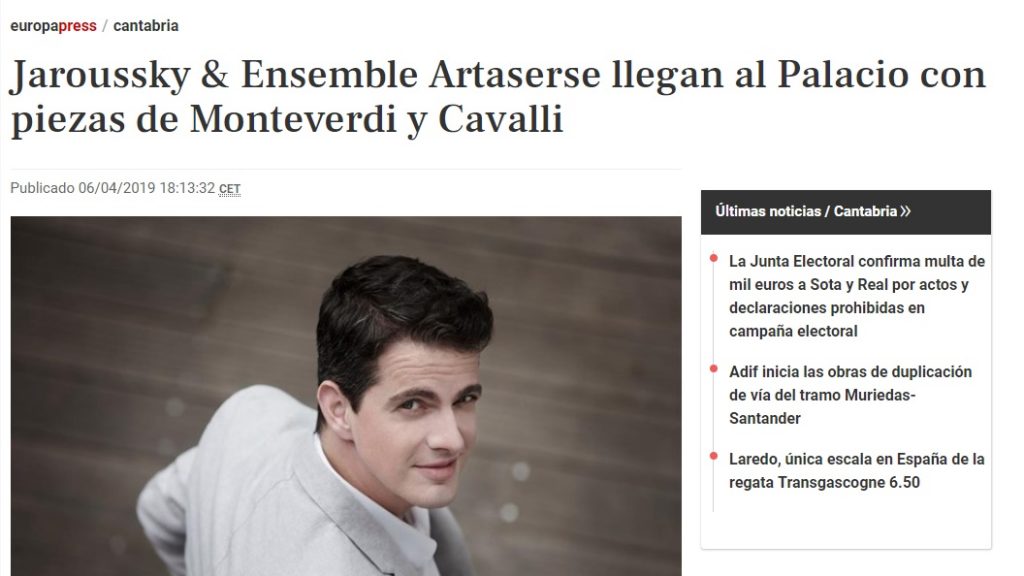
2019-04-06, France Inter, by Anna Sigalevitch
Le contre ténor consacre son nouvel album au compositeur vénitien Francesco Cavalli, un des grands maîtres du seicento. Un disque paru sur le label Erato
Source/Read more: [x]

2019-04-05, Forum Opéra, by Brigitte Maroillat
Le florilège des contrastes
Emouvant, ironique, profond, exubérant à l’image de l’album Ombra mai fu, ce récital capte l’auditoire par sa parure variée lui donnant la saveur d’un délicieux cocktail coloré à consommer sans modération. Dans l’écho de cette soirée réussie, on est d’ailleurs saisi de l’irrésistible envie de réécouter le CD pour prolonger le plaisir d’œuvres rares d’un compositeur à redécouvrir. Philippe Jaroussky a réussi le pari de nous intriguer et finalement de nous enchanter, avec l’art consommé de sans cesse se renouveler dans des répertoires inattendus.
Source/Read more: [x]
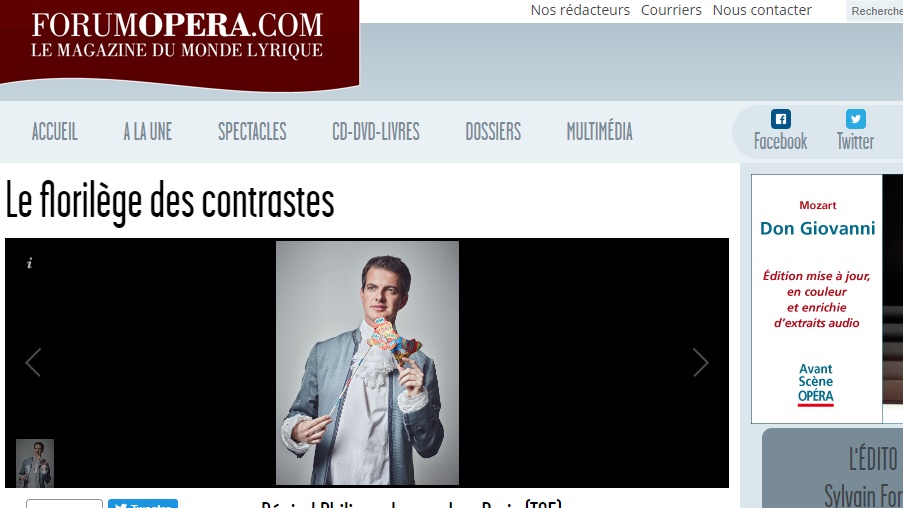
2019-04-05, Hannoversche Allgemeine, by Rainer Wagner
Es beginnt mit einem Trommelprolog und es endet mit einem hannoversch gesitteten Sturm der Begeisterung. Dazwischen entfaltet der französische Countertenor Philippe Jaroussky mit seinem Ensemble Artaserse einen Fächer der Empfindungen. Allesamt klanggemalt von Francesco Cavalli, dem fleißigen Schüler Claudio Monteverdis.
Source/Read more: [x]
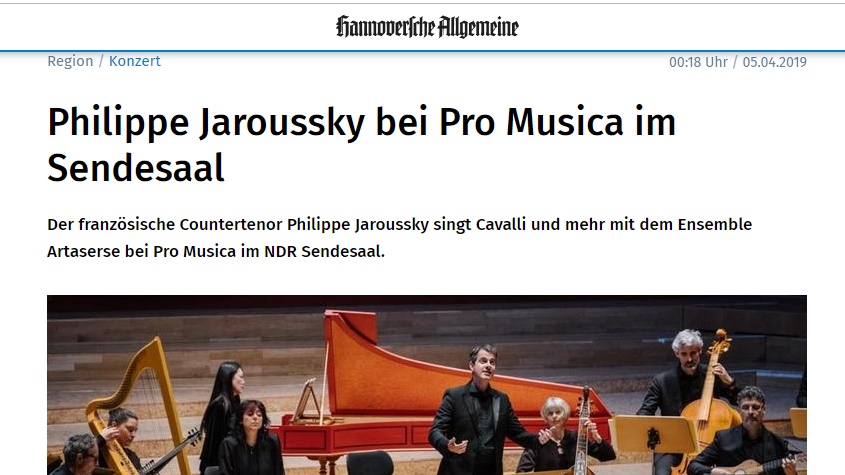
2019-04-05, Vltava, by Daniela Jäger
Nová nahrávka hvězdného francouzského kontratenoristy. Poslechněte si recenzi Daniela Jägera.
(…) Jaroussky dokáže všem interpretovaným postavám z Cavalliho oper vtisknout opravdovost a tím defacto legitimuje – i více než 350 let po napsání těchto děl – jejich divadelní životnost. Činí tak občas na úkor intonační přesnosti i znělosti některých souhlásek, jeho hlas je tak v absolutní službě dramatu, což dokonale podporuje také patnáctičlenný soubor Artaserse, který Jaroussky spoluzaložil před sedmnácti lety. Jeho hudebníci jsou velmi citliví a empatičtí vůči sólistovi v ryze hudebním vyjádření vášní prostřednictvím měnících se odstínů a barev. V tom je v případě tohoto typu hudby samozřejmě určitá interpretační svoboda, která zde ale dosahuje doslova symbiotické dokonalosti. (…)
Source/Read more/Listen to podcast: [x]
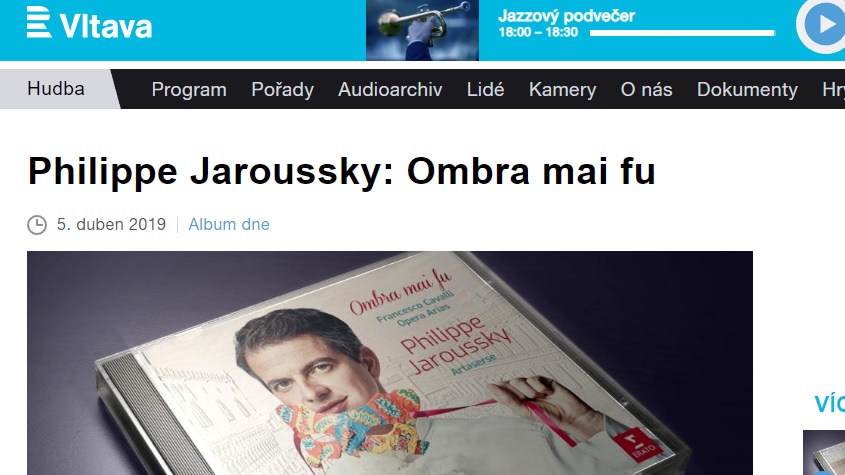
“[…] Jaroussky weaves notes as fragile as the finest threads of spun glass. That still they shine vibrantly is purely due to Jaroussky’s delicate vitality, his moderately tasteful use of means of expression that he seems to have at his unlimited disposal.
Translation to English
This is a fan translation; no infringement of copyright is intended. We believe it fulfills the criteria for “fair use,” discussion and study. Translation by *L
2019-04-05, Die Welt, by Sören Ingwersen
By Sören Ingwersen
Just over two years ago, the Elbphilharmonie was inaugurated, and people believed that an angel was spreading his wings, protecting the new concert hall. At any rate, Philippe Jaroussky was celebrated as this heavenly messenger, who, high up above in the tiers and accompanied by the finely spun sounds by the harpist Margret Köll, seemed to immerse the hall in divine light. The performance remained engraved into many people’s minds and made the Frenchman who turned 41 this year become something like an unofficial figurehead of the new music temple.
Later that same year, Jaroussky returned with the French Ensemble Artaserse to set Händel’s arias in the gold of his voice. Once more, he now returns to the stage of the the great hall of the Elbphilharmonie with the 12 Baroque specialists – this time, to honor a master who was celebrated as a great opera composer during his lifetime, but who nowadays is hardly known: the Venetian Francesco Cavalli, pupil of the great Claudio Monteverdi, who invented the genre of opera in the early 17th century.
Jaroussky and the Ensemble Artaserse open a musical treasure chest brimming with beguiling riches that night. The first sparkle that catches our eye right at the start is the aria “Ombra mai fu” from the opera “Il Xerse”, carried by great tranquility. Just as dedicated, as Jaroussky sinks into the worship of a tranquil nature, afterwards, in “Corone, ed Honori” from “Il Ciro,” he puts inner freedom of man in the balance of true values, contrasting it with courtly flashiness, while Raul Orellana and Jose Manuel Navarro energetically highlight the fiery confession with their violins, percussionist Michèle Claude lets the castanets pop, and Yoko Nakamura sets inciting accents at the cembalo.
Immediately afterwards, Jaroussky presents the same character with the heart-gripping lament “Negatemi i respiri.” “Take away the air I breathe,” demands the desperate king, while Jaroussky’s voice, effortlessly spiraling upwards, never even has a hint of forcefulness, subordinating every tinge of rigor to a smoothly flowing line. A pleading chant that is reaching the very last rows, while never becoming obtrusive. Also in “Amor, ti giuro Amor” from “Erismena”, introduced by a highly dramatic recitative, one cannot help but marveling at the ease with which the singer tackles the ornaments and the well-controlled use of the vibrato which often only unfolds at the end of a sustained note, triggering oscillations that leave the antennas of the soul resonating in a sympathetic shiver at every second.
In “Lucidissima face,” Jaroussky embarks on a completely different adventure. There, his flawlessly intonated soprano glides without resistance like on a shiny smooth surface. Before the inner eye, it reflects the moon that the words proceed to worship. In contrast, the funny, exuberant “Che città,” depicting the hustle and bustle of city life, with its bass lines of the viol at the start, and the rhythm of the drums, gives the impression of an early Baroque pop song. While Jaroussky is circling the musicians, establishing 360-degree contact with the audience, illustrating almost every syllable with a meaningful gesture, once more, the Ensemble Artaserse proves to be a first class accompaniment. Also in the interspersed instrumental pieces, the nine Sinfonias, it manages to connect sensitively balanced precision with brilliantly refined variety of sound, and a high level of articulation. Especially Adrien Mabire and Benôit Tainturier impress with their clearly intonated play on the cornet, a kind of wooden recorder-trumpet from the Renaissance period.
Shortly before the break however, during the pain-stricken love aria “Uscitemi dal cor, lagrime amare,” almost all the instruments need to fall silent, while Jaroussky weaves notes as fragile as the finest threads of spun glass. That still they shine vibrantly is purely due to Jaroussky’s delicate vitality, his moderately tasteful use of means of expression that he seems to have at his unlimited disposal. In moments like this, the listener gets the impression that the hall was contracting, while at its centre of sound, the essence of human suffering crystallizes.
Filled with inner drama, the aria “Misero, così va?” shines in incandescence, while the cornets highlight the sound of the ensemble like with flares, while in “All’armi mio core,” the music begins to gain dance-like momentum once more. The audience’s applause is rewarded with three encores, including an assertion of happiness by Cavalli, introduced by Jaroussky as “one of the shortest arias in the history of music”: a one-minute jubilation set to music. The musical bliss that night fortunately lasted longer: a generous 90 minutes.
Source/Read more: [x]

2019-04-04, Klara, by Els Van Hoof
Op deze cd vind je een mooie balans van uitbundig zang- en musiceerplezier en oprechte ontroering. Top! […]
Source/Read more: [x]
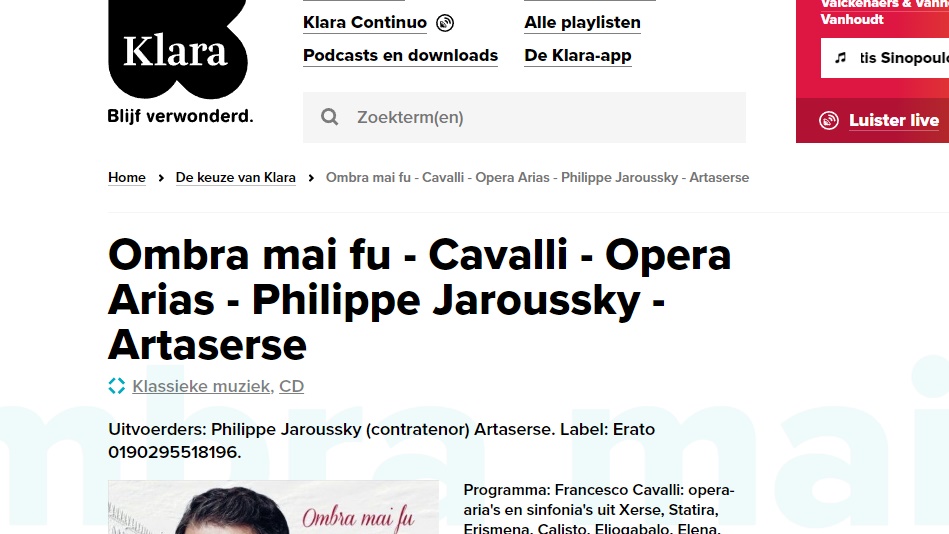
2019-04-04 , Hamburger Abendblatt, bei Joachim Mischke
Jaroussky erwies sich auch an diesem Abend als kluger, einfühlsamer Anwalt verschütteter Meisterwerke, die man mit Samthandschuhen anfassen muss, weil sie trotz ihrer Stärke so zerbrechlich sind wie Murano-Gläser beim Jonglieren. […]
Source/Read more: [x]
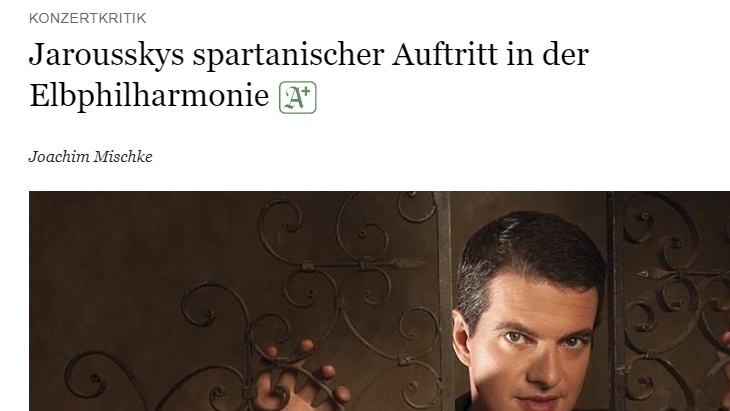
2019-04-04, Cellesche Zeitung, by Jörg Worat
“Schon seit Monaten war der Große Sendesaal des NDR ausverkauft: Unter den Countertenören ist Philippe Jaroussky zurzeit wohl der König. Nicht zu Unrecht, wie er mit tatkräftiger Unterstützung des Ensembles Artaserse an diesem Abend bewies.” […]
Source/Read more: [x]
